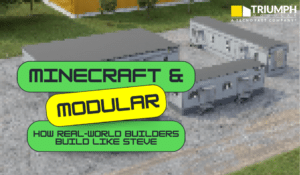Gone are the days when modular homes were widely considered low-quality, cheap housing options. With advances in modular housing materials and building techniques, they’re now a completely viable option for those looking at homeownership as a lifelong dream.
The question remains: What are the advantages of modular housing? What makes it a great alternative to homes built with traditional construction?
Thankfully, with Triumph’s extensive experience in modular housing, we’re here to answer this question.
Before we dive too deeply into modular housing advantages, we should first take a step back and define what modular homes really are.
What are Modular Homes?
To put it as simply as possible, the biggest difference between modular homes and conventional homes is that modular homes are built primarily off-site, while conventional homes are built on-site. This means that once the pre-built structure is finished, it’s then transported to the site and assembled by a homebuilder.
Modular homes are often alternatively called “prefab” homes. Either way, the premise is the same.
Modular Housing Advantages
With that definition in mind, let’s get into modular housing advantages.
While there are many to be named, we’re going to stick to a few key benefits that set modular homes apart from their conventionally built counterparts.
Speed to Occupancy
The modular construction industry as a whole lays claim to incredible speed to occupancy rates, and that makes it one of the biggest modular housing advantages.
Why is this?
When you consider everything that can delay the building process of a traditional home, such as inclement weather or material transportation errors, it’s easy to see why the prefabrication process for modular housing is so beneficial. Because modular homes are built indoors and the materials for specific builds are already on site, these delays are entirely avoided.
While not everyone values speed to occupancy with respect to housing, for those who do find themselves looking for a new housing option as quickly as possible, modular homes are certainly an option worth considering.
Cost Predictability
Price is always one of the first aspects taken into consideration with any purchase, and housing is no exception. In fact, within the modular construction realm exists many affordable housing options.
Traditional housing construction sites can be unpredictable. Sudden change orders may come in which can raise costs beyond what some people are comfortable with. With modular housing build practices being more rigid and set in stone, the costs are far more predictable and many of these unexpected changes are avoided.
If cost predictability is something you’re concerned about (which many people are), then be sure to consider modular housing.
Higher Quality, Controlled Construction
The construction process that modular homes go through is an advantage itself.
Why is this exactly?
Due to the assembly line type of construction used for modular housing, there’s a higher degree of precision being dedicated to every part of the building itself. The repetition and automation lead to the highest quality product possible.
Not only that, but many aspects of construction are out of a project manager’s control on a typical building site. For example, inclement weather can lead to moisture buildup on certain materials. The controlled environment where modular homes are constructed helps remove these variables altogether, while simultaneously upholding the same building standards as traditional construction.
Less Waste
It’s no secret that traditional construction sites produce unfathomable amounts of waste. Thankfully, modular housing processes help clean up much of the waste through a few different channels.
First of all, since modular construction companies have zeroed in on their building processes, they can not only better gauge how much material is needed for each build, but they’re also able to recycle materials more efficiently for future building projects.
Next, we need to think about wasting time and money. With traditionally constructed homes, job sites can run into several waste-creating issues, including:
- Accidental damages
- Theft
- Vandalism
Again, since modular housing projects are built off-site, all of these problems are largely avoided. This is precisely how waste reduction becomes one of the biggest modular housing advantages.
Energy Efficient
Energy efficiency is one of the most important modular housing benefits. The question is, how do modular construction practices manage to actually lower energy costs?
Coming back to the prefabricated aspect of modular housing, since the manufacturing is done in a plant, this facilitates the application of different energy-saving practices. For example, certain sealants can be applied in harder-to-reach areas.
Triumph’s Action Housing Authority project is a prime example of modular housing built with energy efficiency at the forefront, combining building practices that minimize waste with green materials designed to maximize energy efficiency.
Energy efficiency matters. Thankfully, modular housing delivers on that front.
Modular Housing Advantages Summary
While it might not be the right option for everyone, there’s no denying that modular housing comes with a wide assortment of benefits. From saving energy to sheer building speed, there are several reasons to consider modular over traditional homes. At the end of the day, it depends on your specific needs.
Looking for More Information on Modular Housing Advantages?
Whether you want to know more about the benefits of modular housing, or if you’re interested in Triumph’s modular construction, don’t hesitate to reach out to us. We’re happy to help.




